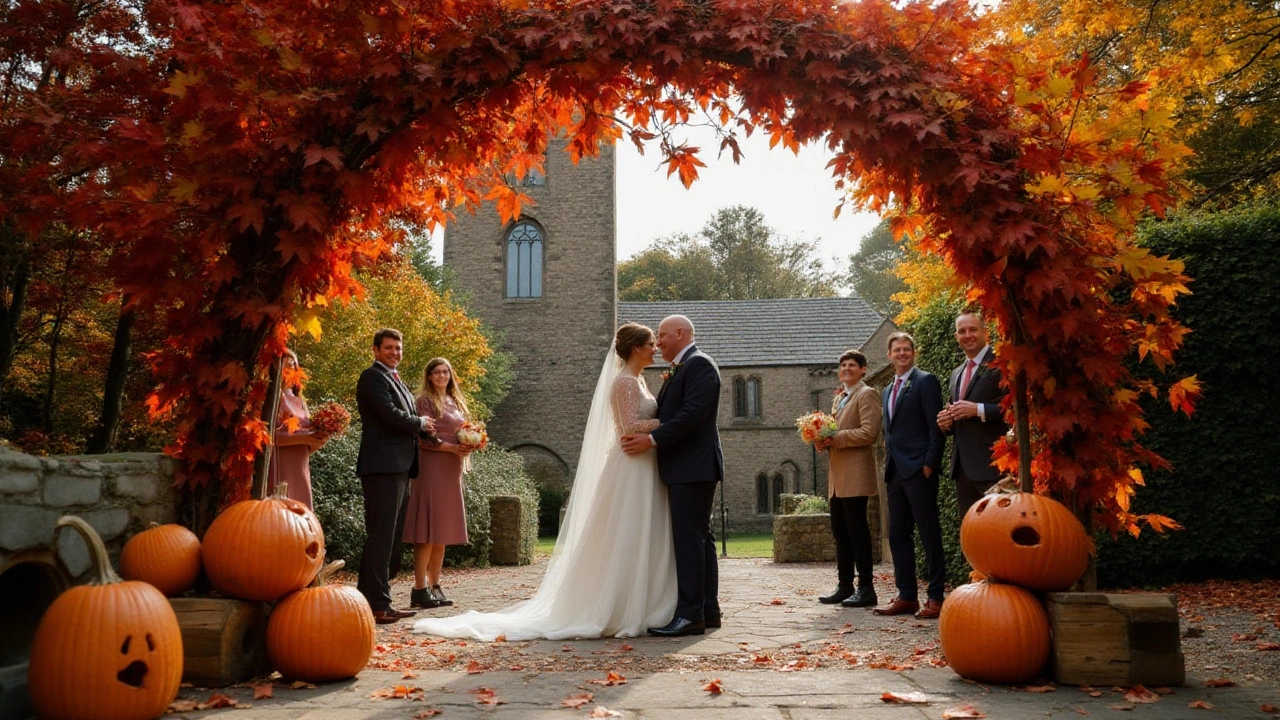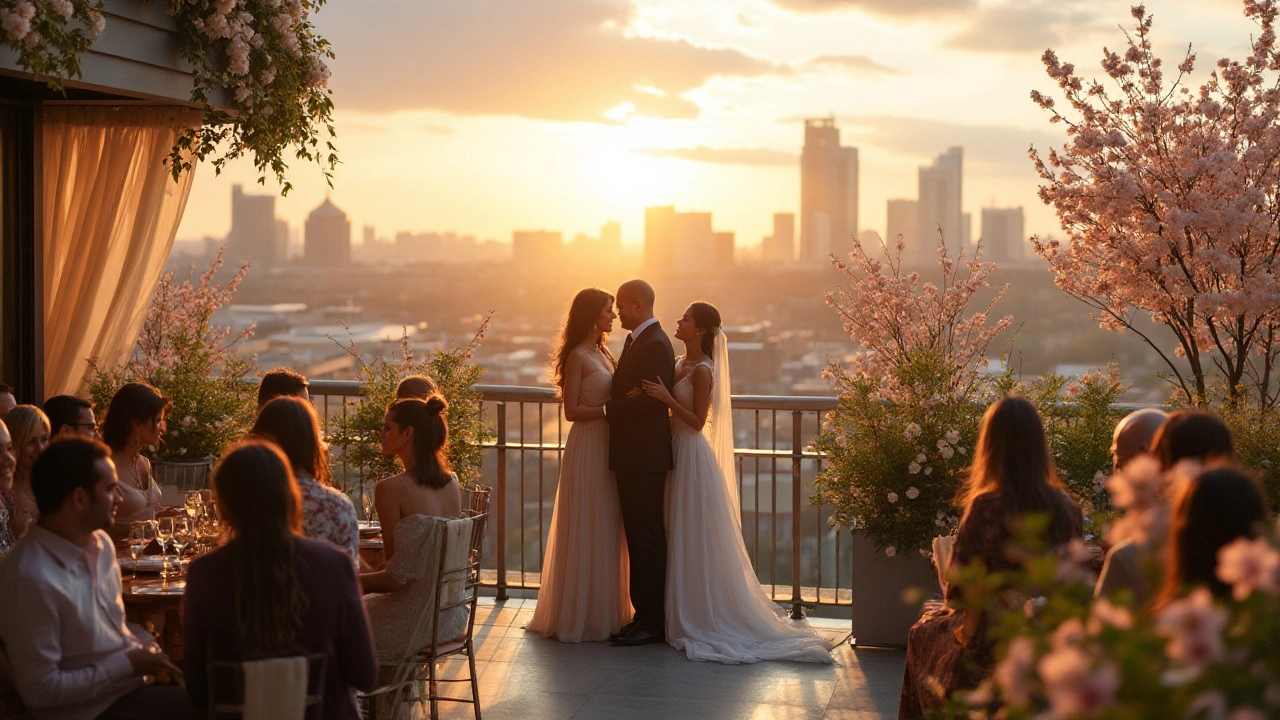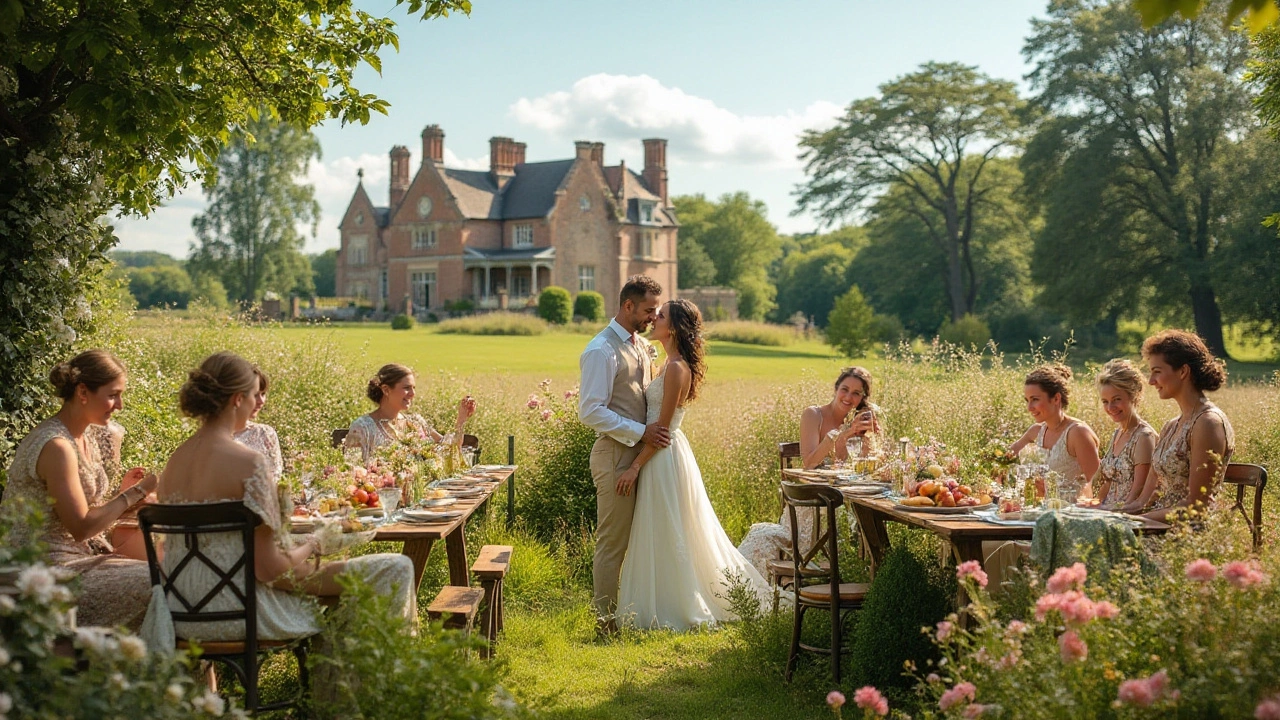Choosing the ideal month for a wedding in 2024 involves more than just deciding a convenient date. Many believe that certain months carry luck, beauty, and symbolic meanings that might enhance a marriage's journey. These perceptions aren't merely based on old wives' tales—they're a melting pot of various cultural superstitions, astrological advice, and weather patterns.
Aligning your wedding plans with a month that promises not just pleasant climates but good fortune can seem a daunting task. Whether you're drawn to the blooms and freshness of spring or the rich and warm colors of autumn, each month brings unique opportunities for creating stunning wedding decorations and unforgettable ambiance.
- Understanding Wedding Luck
- Best Weather Months for Weddings
- Cultural Superstitions and Traditions
- Seasonal Decor Inspirations
- Tips for Planning a Lucky Wedding
Understanding Wedding Luck
The concept of luck in weddings is as diverse as the rituals themselves. Many couples believe picking the right month can set the stage for a lifetime of blissful marriage. This idea of a "lucky" month dates back to ancient times when calendars and celestial bodies held mystical significance. Over the years, cultures worldwide have linked certain periods with positive energy that could influence the future of newlyweds.
For instance, in some European countries, June has long been associated with good fortune due to its connection with Juno, the Roman goddess of marriage and childbirth. Marrying in June was thought to bring prosperity and fertility. Similarly, in Hindu culture, the lunar calendar plays a crucial role, with Akshaya Tritiya considered one of the most auspicious days for tying the knot. Perhaps it's the timing or the alignment of stars, but traditional beliefs are deeply rooted in the fabric of these societies.
It's fascinating how these diverse beliefs intersect with modern planning. Today, while some couples choose their wedding month based on seasonal amenities and personal schedules, others still consult astrologers and consider numerology to determine a "lucky" marriage date. The widespread popularity of such practices suggests a broader human desire for assurance—a belief that the cosmos and luck favor the brave.
"Luck is not chance, it's toil—fortune's expensive smile is earned," poet Emily Dickinson's words resonate with many couples who believe that while luck can guide us, effort and love are the true sustaining forces.
There are, of course, skeptics who view wedding luck as charming superstition. Regardless, it remains an essential part of wedding traditions worldwide, a testament to the creative and diverse ways humans seek harmony with the universe. This blend of science, emotion, and tradition adds a layer of depth to the planning process, offering an opportunity to engage with ancient practices while shaping new marital narratives.
As you contemplate your marriage journey, consider how the concept of wedding luck intersects with personal beliefs and aspirations. Whether influenced by cultural heritage or personal convictions, choosing a "lucky" month becomes an opportunity to connect past, present, and future, crafting a unique story that begins with "I do." Embrace both tradition and modernity, and let your wedding month be more than a date—it can be the launch of a lifetime filled with cherished memories and delightful surprises.
Best Weather Months for Weddings
When it comes to planning a wedding, the weather plays a pivotal role in setting the perfect stage for this special occasion. In 2024, choosing the best weather month can help ensure not just a smooth celebration but also a memorable experience for both the couple and their guests. Depending on the location, weather conditions vary greatly, and each season offers its own distinct charm and set of challenges. In Australia, for instance, the months of March and April, which fall in autumn, are considered ideal due to milder temperatures and lower chances of rainfall. The crispness of autumn offers cooler days, making outdoor weddings comfortable and allowing for stunning photographic opportunities among vibrant foliage.
On the other hand, springtime, spanning September through November, is equally popular as it heralds blooming flowers and rejuvenating weather, providing a plethora of natural decor options without any extra costs or elaborate setups. The combination of pleasant weather and the explosion of colors in nature make spring weddings particularly enchanting. A spring wedding can include romantic garden themes with a variety of fresh flowers available for bouquets and arrangements. However, it's important to keep in mind that this season can sometimes bring sudden showers, so having a plan B, like a rented marquee, is a smart move.
In terms of global preferences, summer remains the most sought-after season for weddings in many regions, though it can be sweltering in places like Sydney, where temperatures peak in January. For those who prefer ‘sunshine’ weddings, it's crucial to select venues that offer shaded areas or air-conditioned spaces to keep guests comfortable. Seal this thought by ensuring refreshing beverages and a variety of light attire options for guests to manage the heat. With careful planning, opting for a summer wedding can mean longer daylight hours for celebrations to extend well into the evening. According to a survey conducted by The Knot, 80% of couples said the weather was a determining factor in choosing their wedding date, highlighting its importance in the planning process.
For those aiming for a winter wonderland theme, June through August in Australia offer a unique, intimate atmosphere albeit with cooler temperatures. Winter weddings are increasingly adored due to their cozier appeal and the ease of finding venue availability compared to peak seasons. Couples can also capitalize on off-season discounts from vendors. However, it’s crucial to consider that shorter daylight hours may affect photography timing and lighting setups, which requires coordination with your photographer to capture those heartwarming indoor moments.
Making your wedding date decision involves balancing the weather's natural beauty with your logistical needs, and perhaps even your personal luck preferences. Wedding month choices are often a reflection of the couple’s personalities and preferences, but ensuring that the selected month aligns with fair weather conditions can help mitigate potential stress. Selecting the perfect weather month enhances not only the ambiance but also every aspect of one’s wedding planning and execution. By understanding the season's inherent strengths and potential pitfalls, you're far more likely to enjoy a ceremony that flows seamlessly from start to finish.

Cultural Superstitions and Traditions
When planning a wedding, the choice of month can hold more importance than just convenience or weather considerations. Across various cultures, marrying at a time deemed auspicious is believed to set the tone for a harmonious and prosperous union. Traditions around the world highlight that specific months not only impact the atmosphere of your big day but also the trajectory of your married life. For instance, in the traditional Chinese calendar, the lunar months play a crucial role in deciding wedding dates, often preferring months like August, which aligns with the Ghost Festival, as a less favorable time. Such beliefs are deeply ingrained and guide many families in their wedding planning.
In Western cultures, June continues to be one of the most popular months to tie the knot, harking back to Roman times when the month was dedicated to Juno, the goddess of marriage and childbirth. This association implies blessings and luck for new couples. Moreover, British traditions consider May as an unlucky time for weddings, expressed in the rhyme, "Marry in May, and you'll rue the day," showcasing how these cultural superstitions might influence decisions even today. Observing how astrologers offer guidance on the best marriage months by the alignment of celestial bodies adds another layer of intrigue to this blend of tradition and astrology.
Lucky and Unlucky Months
It's fascinating to explore how some months are considered particularly lucky or unlucky for weddings due to cultural beliefs. Indian tradition, for instance, often chooses dates based on the Hindu calendar, aiming for a time considered as 'Shubh Muhurat.' These days are said to guarantee spiritual alignment and ensure lasting harmony between the couple. In contrast, months like July face taboos, influenced by historical events and ongoing superstitions. This practice reveals an intricate connection between personal milestones and cosmic cycles, giving the wedding date selection a deeper significance.
Cultural beliefs also influence the details, including decor and wedding themes, marrying these customs with personal taste. For example, in Japan, choosing to marry on Taian days—deemed lucky in the traditional Rokuyo calendar—might integrate specific color schemes or motifs known to attract fortune. Strong ties to the past continue to resonate, providing couples with a sense of continuity and grounding amidst modern wedding planning challenges.
Seasonal Decor Inspirations
When it comes to wedding decorations, the time of year can heavily influence the choice of colors, textures, and even the kind of flowers that will be available. Each season offers its own distinct palette and atmosphere, helping you create a visually stunning celebration that complements the spirit of the time. Spring weddings, for instance, often boast pastels and vibrant greens, mirroring the blooming world around. This season is perfect for incorporating fresh blossoms such as tulips, daffodils, and sweet peas, all of which symbolize new beginnings and beauty. Arranging these flowers in whimsical, garden-like settings or elegant bouquets can evoke a fairytale aura.
Summer, known for its warm temperatures and long days, opens the door for outdoor ceremonies and a brighter color scheme. Opt for bold hues like coral, turquoise, or sunny yellow to capture the joy and energy of the season. Incorporate lightweight materials that move with the breeze, such as chiffon or organza, to add a touch of playfulness to your decor. Don't forget practical elements like shaded tents or fans, as keeping guests comfortable during a summer ceremony is crucial for lasting positive memories.
As autumn arrives, it brings a cozy touch with its rich, earthy tones. Think about using deep reds, oranges, and golds, which can naturally complement an autumn wedding's decorations. These colors can be beautifully intertwined in tablescapes with pumpkins, acorns, and rustic wooden elements, which add warmth and depth. Consider incorporating autumnal motifs like leaves and harvest fruits not only in floral arrangements but also as part of your table centerpieces or even your wedding cake decorations. As author and event planner David Stark mentions, "Autumn is about transition; it adds a layer of organic richness to any event."
Winter weddings, although less common, provide a unique opportunity for a magical celebration. Imagine a wonderland of whites combined with icy blues or silver accents, creating a serene and elegant backdrop. It's a season that permits more opulent materials such as velvet and satin, which can lend a cozy and sophisticated feel. Utilize seasonal greenery like pine branches, holly, or mistletoe to add texture and a classic wintry touch. Ambient lighting through candles or fairy lights can enhance the intimacy of a winter wedding ceremony, echoing the warmth amidst the cold.
Understanding what each season brings in terms of natural beauty and cultural symbolism allows you to craft wedding decorations that resonate deeply with both you and your guests. Whether it’s through the use of season-specific flora or popular cultural motifs, these decorative elements can tell a story that is uniquely yours, leaving a lasting impression. For couples planning their special day, selecting the month and corresponding decor is about more than just aesthetics; it's about setting the scene for memories that endure beyond the big day.

Tips for Planning a Lucky Wedding
Planning a wedding is often laden with hopes for a joyous future, and many couples believe that incorporating elements of luck can help pave the way for a prosperous marriage. First and foremost, selecting the luckiest month to get married is a good starting point. Certain months, such as June and September, are often regarded as fortuitous due to their connections with deities of marriage and harvest. But regardless of the month you choose, there are various ways to infuse luck into your big day. Consider integrating traditional good-luck symbols from around the world. Horseshoes are a classic symbol of good fortune, believed to ward off evil spirits. Hanging one at your ceremony entrance could offer a touch of charm and history. Another customary symbol is the four-leaf clover, often used in place settings or bouquets to infuse luck into the celebration.
Choosing the right location is also important when thinking about luck. Some locales are famous for pulling off exceptionally blessed wedding ceremonies. A romantic garden, steeped in natural beauty and fresh life, might provide the perfect auspicious backdrop for exchanging vows. When selecting your venue, inspect the layout for potential areas that might align well with wedding decorations that naturally invite good luck. Consider using colors traditionally associated with positive energy. In many cultures, red is seen as a sign of prosperity and happiness, and incorporating it into your décor could enhance that sense of fortuity. Complementing red with gold accents can add a touch of opulence and enhance the vibe of celebration.
Aligning Your Wedding Date with Auspicious Times
Another vital aspect is choosing the time of the ceremony. Couples might refer to an astrologer or numerologist to pinpoint a time when the stars are aligned favorably for their union. Such practices can seem esoteric but may hold particular significance for some. Using numerology, couples could choose a date where the numbers correspond to specific meanings that resonate with their shared journey, such as a number that symbolizes harmony or adventure. Time honored rituals performed during the ceremony can also contribute to a sense of luck. The hand-fasting ritual, originating from Celtic traditions, involves tying a piece of cloth around the couple's hands, symbolizing the union and bond they are committing to. This ancient ritual not only speaks to the history of marriage but also emphasizes the couple's commitment to a lucky, happy life together.
Incorporating personal elements is equally vital for adding meaningful luck to your celebration. Items believed to bring good fortune, like family heirlooms or gifts passed down through generations, might be included as part of your outfit or carried as tokens. Something old, something new, something borrowed, something blue, this classic refrain exemplifies how items can bear symbolic promises of prosperity and happiness in married life. While organizing these components, the emphasis should always be placed on the significance they carry for the couple and the way they wish to start their married life.
Dr. Hannah Fry, a prominent mathematician, once said, "Timing, often thought of as mere luck, is the result of complex mathematical choices and chances aligning in perfect sequence." This perspective reminds us that intertwining these elements with personal meaning and intention leads to a well-crafted wedding that's both beautiful and deeply significant.
Additionally, music and entertainment can set the tone for a lucky celebration. Incorporate songs and performances that reflect joy and vitality. Think of music that connects with your culture's happy tunes known for bringing luck or inspiring joyful dancing amongst guests. From traditional ballads to contemporary tracks that the couple adores, a lively, cheerful atmosphere might just blow any negativity away, filling the space with harmonious energy. Ultimately, filling your day with these elements ensures that your wedding is uniquely yours—laced with luck and filled to the brim with love.
